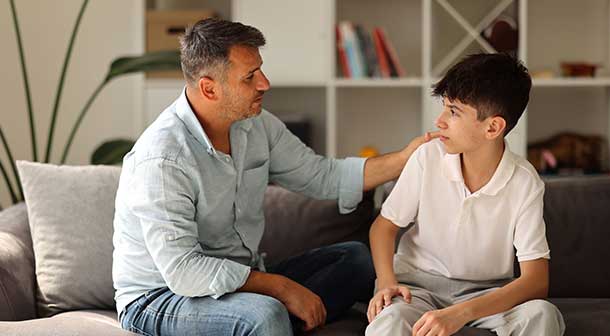Being a parent of a teen is not easy, and dealing with a teen who is drinking alcohol or using drugs can be extremely challenging for the entire family. But the fact is that many teens try alcohol or drugs at some point, and many parents experience firsthand the challenge of dealing with teen substance abuse. The more you understand about why kids experiment with alcohol or drugs, the better you can help them avoid risky habits and get help when they need it.
Perhaps the most important thing to understand is that substance abuse can happen in any family. It's not a sign of bad parenting or a bad kid. Teens are wired to experiment and take risks on the road to independence. Many risks are healthy and positive such as getting a job, trying out for a part in a play, or running for class office, but others can get them in trouble.
Trying alcohol or drugs does not mean a teen will become addicted. However, people who begin substance abuse at a young age are more likely to get addicted than those who wait until they are adults. Addiction itself is a complicated disease that changes the brain and alters how a person thinks, behaves, and feels. It's not a sign of a teen's weak character or a parent's lack of discipline.
Parents are not responsible for their teen's decision to try drugs or alcohol, but they can help find solutions by becoming familiar with basic facts about teen substance abuse .
Did you know? Alcohol, marijuana, and tobacco are the substances most commonly used by adolescents.
It is illegal for anyone under 21 to possess or use alcohol in Texas.
Did you know: About two-thirds of teens have tried alcohol by the time they are in the 12th grade. Underage drinking exposes kids to problems at school, with friends, and at home. Alcohol is almost always a factor in the three leading causes of death among young people: accidents, homicides, and suicides.
No one under the age of 21 can legally buy tobacco, except for those who are at least 18 years old and are in the military.
Did you know: About 40% of high school students have tried tobacco. Electronic cigarettes, commonly called e-cigarettes or vapes, have become more popular among teens than traditional cigarettes. E-cigarettes and traditional cigarettes expose teens to highly addictive nicotine as well as other dangerous ingredients.
Marijuana possession is illegal in Texas at any age.
About half of high school students have tried marijuana. Marijuana and alcohol consumed together is the most frequent combination of substances involved in teen car accidents.
About 20% of 12th graders have used a prescription medication without a prescription.
Prescriptions that are most likely to be misused include stimulants (such as Adderall), tranquilizers or sedatives, and opioid pain relievers. All prescription medications should be safely stored and dispensed according to the doctor's instructions to make sure they are not misused. Check out Medication Safety Tips for suggestions on how to protect kids of all ages from the harmful effects of prescription or over-the-counter medications in the home.
Need parenting help now?
The Texas Parent Helpline is available 24/7.
- Call 833-680-0611
- Chat with us
- Text 833-680-0611
Substance abuse is risky for teens because:
- It can affect their growth and development, especially brain development. For example, drug and alcohol use can affect the parts of the brain that control memory, decision-making, and coordination.
- Teens are more prone to make impulsive decisions after drinking alcohol or using drugs. This may contribute to risky behaviors such as unprotected sex and dangerous driving.
- It can contribute to health problems later in life, such as heart disease and high blood pressure.
Sending clear messages to your children helps them make good decisions. In a 2018 nationwide survey, more than half of teenagers said the main reason they wouldn't use drugs was because their parents disapproved.
Why do teens experiment with drugs and alcohol?
Adolescents are naturally wired to try different things as they move toward adulthood. For example, they may regularly change their hairstyle, clothing preferences, or favorite music as they find their own place in the world. Some adolescents experiment with substances because they feel peer pressure and want to fit in. Other common reasons teens try drugs and alcohol include:
- To feel good in social situations.
- To feel better when they are alone.
- To do better socially or academically.
- To try new experiences.
- To act more “grown up”.
All of these reasons are pretty natural and understandable. As a parent, you may find it helpful to know some of the reasons that teens are tempted to try drugs or alcohol so you can be more prepared to discuss the situation and provide guidance on ways to avoid these behaviors.
What are signs your teen is using drugs or alcohol?
Many teens go through times when they are moody, quiet, sleepy, or sloppy. Those behaviors don't necessarily mean a child is using substances. However, if your teen's mood or personality changes dramatically, or if his (or her) behavior becomes more extreme, you might consider whether drug or alcohol use is behind it.
Here are some signs to look for:
- Changes in mood and personality, such as your teen acting withdrawn, depressed, silent, hostile, angry, or secretive on a regular basis. On the other hand, he may seem unusually unfocused, uninhibited, or hyperactive.
- Changes in normal behavior, especially loss of interest in his normal friends or activities or secrecy about where he goes and what he does. He might lose interest in his classes, skip class, or get in trouble at school. You might also notice long periods of sleeplessness and high energy, followed by long periods of catch-up sleep.
- Changes in hygiene and appearance, such as being unusually messy, forgetting to shower, smelling of smoke or other unusual odors, or having red, flushed cheeks.
- Changes in physical health, such as being tired or feeling bad a lot of the time, having a sudden or dramatic change in weight, or slurring his speech.

How and where to look for signs of substance abuse
If you have reason to believe your teen may be using drugs or alcohol, here are some steps you can take to get more information:
Use your nose.
If he's been drinking or smoking, you will be able to smell it on his breath, hair, or clothes. Have a talk with him when if he comes home smelling of smoke or alcohol after hanging out with friends.
Look him in the eyes.
- Red, heavy-lidded eyes with small pupils may be a sign of marijuana use.
- Large pupils and difficulty focusing may be a sign of alcohol use.
Watch his behavior.
Look for behavior that is not typical for him, like being loud, laughing over nothing, acting unusually tired or withdrawn, being clumsy, or queasy. All of these could be signs of alcohol or drug use.
Search their spaces.
- If your observations lead you to suspect substance abuse , it may be time to search his room, backpack, and digital devices.
- Check out common hiding places such as drawers, small boxes or cases, in between or inside books, inside over-the-counter medicine containers, or inside empty candy bags.
How to have “the talk” about substance abuse
Finding out that your teen is using drugs or alcohol may make you angry, afraid, and perhaps even ashamed at first. Remember that substance abuse can happen in any family and is not a reflection on you or your teen. Try not to react when you are angry; instead, try to take some time to calm yourself and decide on a plan. Here are some suggestions that can help:
Plan to talk with your teen when you are calm and undistracted.
Turn off your mobile devices so you can focus on your conversation. Gather your thoughts in advance on how you want to proceed. One way to set a positive tone for the discussion is to ask questions that show you are interested and concerned rather than being judgmental. Instead of “Why did you come home drunk last night? How did you let that happen?”, you might say, “You smelled like alcohol last night when you came home. What is going on? Why are you drinking?” If you child denies the behavior or says, “I don't know” or “I don't want to talk about it,” you can try being firm and restating your concern: “I know what I smelled and what I saw last night. I'd like to know more about why it happened before we discuss consequences. Please help me understand it better.”
Try using the easy-to-remember CALM approach.
You can always stop the conversation if either of you gets too angry or upset and resume it later when you are calmer.
- C – Control your thoughts and actions.
- A – Assess and decide whether you are too upset to continue.
- L – Leave the situation if you are feeling too angry or upset.
- M – Make plan to deal with the situation.
Avoid negative emotions, such as telling your child he let you down.
Give reasonable consequences for his behavior, such as grounding, loss of driving or other privileges, or taking on extra chores. Next, focus on positive steps you can both take to prevent future substance abuse , which may include learning better time management and health habits, getting involved in different activities, or setting regular check-in times to talk about what's going on.
How to reduce the chance your teen will use drugs
As a parent, you play a key role in educating your child about substance abuse and setting guidelines for the behavior you expect. Your behavior and attitudes over time will help your child make better decisions about drug and alcohol use.
- Make it clear you disapprove of drug use and underage drinking. Set a good example by not using drugs yourself, and by using alcohol responsibly.
- Get to know your teen's friends and be curious about his activities.
- Create an environment where you and your teen can talk about difficult topics respectfully.
- Talk with your teen about the short-term consequences of using drugs and alcohol, ranging from getting kicked off a team or suspended from school to being arrested or injured, as well as long-term dangers.
How to get help for your teen
Many teens experiment with drugs or alcohol and are able to stop on their own. Others need help to quit. If you are concerned about substance abuse, talk to your child's doctor and learn about treatment options available in your area.
- The Family and Youth Success program can help address any conflict or everyday struggles your family may be experiencing through individual and family coaching or counseling. Search for services in your area.
- The State of Texas's Outreach, Screening, Assessment & Referral program can connect you with inpatient and outpatient substance use treatment in your area. You can view a map online or get information by calling 2-1-1 or 877-541-7905 (toll-free).
- Get help by phone or online:
- Texas Youth Helpline
- Texas Substance Abuse Hotline – 1-877-9-NO-DRUG (966-3784)
- National Helpline – 1-800-662-HELP (4357)

Substance abuse can happen in any family and is not a sign of bad character of poor parenting. Don't blame yourself or your teen for substance abuse . However, if your teen is using drugs or alcohol, take a firm stand and get the help he needs to stop. Parents can find support by connecting with other families who are dealing with substance abuse. Al-Anon Family is a good place to start.
Resources
- Family Checkup, National Institute on Drug Abuse
- How to spot the signs of teen or young adult substance use, Partnership to End Addiction
- Outreach, Screening, Assessment & Referral, Texas Health and Human Services Commission
- Parents: Facts on Teen Drug Use, National Institute on Drug Abuse




